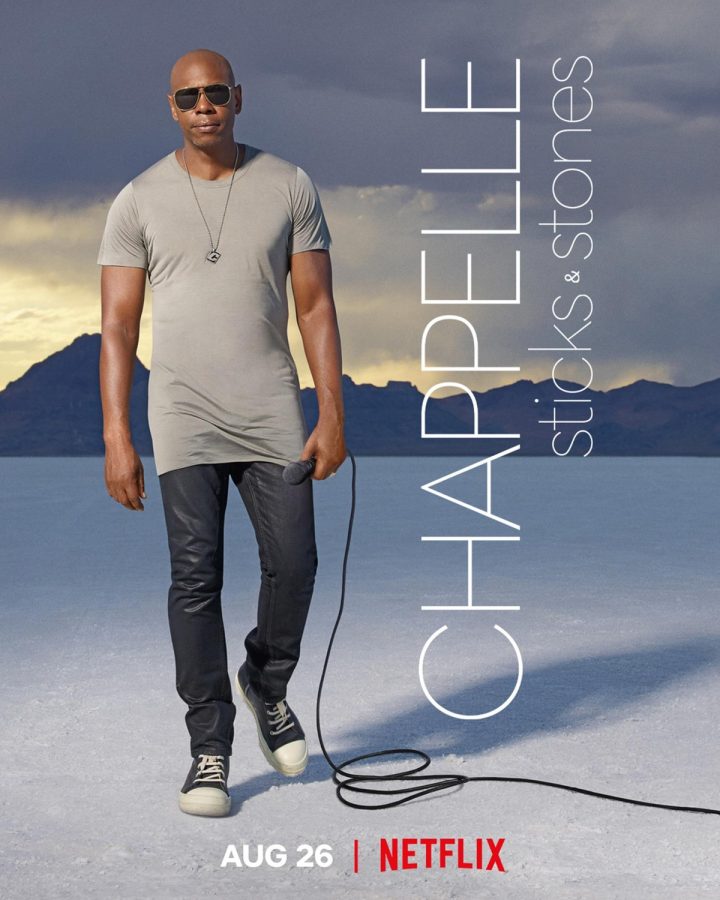Review: What the critics got wrong about “Dave Chapelle: Sticks and Stones”
September 26, 2019
The job of the critic and the stand-up comedian are incredibly similar in many ways. Like the critic, the stand-up comedian works from a position of authoritative observation, a singular figure speaking to an audience of many. And like the critic, the stand-up comedian has historically risked very little while putting others, and often society as a whole, on blast. But things have dramatically changed for the stand-up comedian.
Dave Chappelle’s latest Netflix special, “Sticks and Stones,” shines a direct spotlight on that historical shift in “risk” for comedians.
Chappelle has been working the stand-up comedy scene since the early 90s, and he’s seen first-hand how things have changed for him and his peers. But that’s not the point. The point is that the special was funny, well-written and structured like it was written by the 30+ year comedy veteran that he is.
The skill and genius in Chappelle’s comedic style are in his nonsensical storytelling ability. Just when you think he has just been talking without any direction, BAM! He ties the story back to a major point, one that he was building to the entire time. There is a method to his comic madness, and it was never easy to see, but we got there.
That was primarily how most of the special was structured, jokes that leave you almost more impressed than dying laughing. The special was itself comedic genius, and I don’t think anyone would deny that. Not even the critics who rated it so poorly.
The controversy surrounding the rating of Chappelle’s special is that the audience score in no way reflected the critic score. While (as of Sept. 24) 37,583 Rotten Tomatoes users gave the audience score a 99%, the highest rating a television show or film can have on the website, 17 critics gave the special a dismal 31%. These are some U.S. Senate-levels of uneven representation.
And all of it has to do with perceived intent. Reading through many of the negative critic reviews, few of them mention the quality of the special’s writing, delivery or overall funniness, but rather, assume malice intent in Chappelle’s words and judge him based on that assumption. An example is in Melanie McFarland’s, rated as a “Top Critic” by Rotten Tomatoes, review of the special.
“I have a different theory. On the whole, ‘Sticks & Stones’ exists as a defiant design to intentionally offend large swaths of the audience Chappelle deems too thin-skinned and easily outraged, too quick to find offense, while serving up simple, low-bar yucks to anyone yearning for validation of their anti-P.C. stance.” McFarland said.
Where McFarland fails here is in her attempt to get into Chappelle’s head and judge his inferred intent. She does not even touch on the quality of the special’s direction or production or comedic brilliance in Chappelle’s writing. And in doing so, she has failed in her job as a critic.
As casual consumers of media and culture, we rely on these “Top Critics” to honestly and fairly judge the quality of the content that we consume. We expect scores and ratings to give us an accurate look at the quality, not a critic’s personal disagreements with an artist’s assumed intent.
Now, for argument’s sake, let’s say that these critics have a point. Offensive jokes for the sake of being offensive are inherently low quality and should take away from Chappelle’s special’s overall score. Even then, I disagree that that’s what’s happening here.
Nerdwriter writer Evan Puschak did an in-depth video essay on how comedians are the moral detectives of our society. Just as we empathize with and allow criminal detectives like Sherlock Holmes or other detectives in television or film to bend the rules of morality for the greater good, we should give elite comedians the same reasonable leeway in order to approach taboo topics or point out hypocrisies in the zeitgeist.
“If we want our collective morality to remain nuanced and progressive, we have to let comedians near the things we find uncomfortable or perhaps, even wrong,” said Puschak.
In that way, Chappelle played the role of moral detective perfectly.
A perfect example of this is when Chappelle describes his experiences seeing heroin-addicted white people all over Ohio for the first time. The picture he paints with his words is clear and at-times really funny, but also talks about the gravity of the opioid epidemic, and how it’s destroying lives and families. But then, Chappelle compares the opioid epidemic to the crack epidemic that disproportionately affected primarily African-Americans in the 80s.
“And all this s— they talk about on the news about how divided the nation is, I don’t believe it. I feel like, nowadays, we’re getting a real good look at each other.” said Chappelle. “I even have an insight into how the white community must’ve watching the black community go through the scourge of crack … because I don’t care either.”
Again, I’m not going to attempt to get into Chappelle’s head and give you a definitive statement on whether he was joking or not (though to me, it’s pretty clear that he is), because regardless of intent, Chappelle is pointing out a hypocrisy in how victims of the crack epidemic were treated like criminals and degenerates and how victims of the opioid epidemic are being treated like sick people going through a health issue.
Despite snobby backlash and the changing perceptions of the comedy sphere, Chappelle has created a well-written, well-delivered, funny comedy special where the humor seems to come secondary to profound moral detectivism.
Rating: 8/10









Tk • Oct 5, 2021 at 9:31 pm
And “Birth of a Nation” is a masterpiece. 🙂
Auwal • Sep 27, 2019 at 5:53 am
You’ve already spoken my mind. I will just commend you for doing that. I am not an American, but I have been keenly observing the ‘cancel’ culture with a fear that it could cost the rest of the world the chance to connect with the most creative part of America. Dave Chappelle has just given me hope that may be not just yet. Yes, some people may need to be cancelled, those that hold the same obscene views that they held yesterday. But those that have changed deserve our understanding, forgiveness and compassion. I think that was one of the major points of ‘Sticks and Stones.’